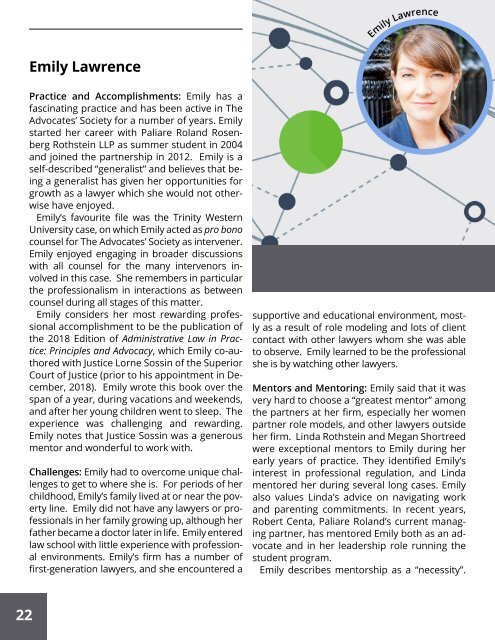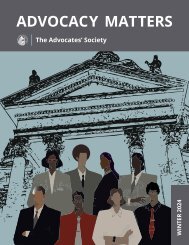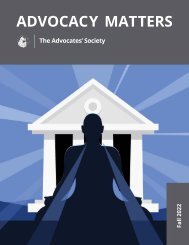Advocacy Matters - Spring 2020
Keep up to date on what your fellow Society members have to say in Advocacy Matters.
Keep up to date on what your fellow Society members have to say in Advocacy Matters.
You also want an ePaper? Increase the reach of your titles
YUMPU automatically turns print PDFs into web optimized ePapers that Google loves.
Emily Lawrence<br />
Emily Lawrence<br />
Practice and Accomplishments: Emily has a<br />
fascinating practice and has been active in The<br />
Advocates’ Society for a number of years. Emily<br />
started her career with Paliare Roland Rosenberg<br />
Rothstein LLP as summer student in 2004<br />
and joined the partnership in 2012. Emily is a<br />
self-described “generalist” and believes that being<br />
a generalist has given her opportunities for<br />
growth as a lawyer which she would not otherwise<br />
have enjoyed.<br />
Emily’s favourite file was the Trinity Western<br />
University case, on which Emily acted as pro bono<br />
counsel for The Advocates’ Society as intervener.<br />
Emily enjoyed engaging in broader discussions<br />
with all counsel for the many intervenors involved<br />
in this case. She remembers in particular<br />
the professionalism in interactions as between<br />
counsel during all stages of this matter.<br />
Emily considers her most rewarding professional<br />
accomplishment to be the publication of<br />
the 2018 Edition of Administrative Law in Practice:<br />
Principles and <strong>Advocacy</strong>, which Emily co-authored<br />
with Justice Lorne Sossin of the Superior<br />
Court of Justice (prior to his appointment in December,<br />
2018). Emily wrote this book over the<br />
span of a year, during vacations and weekends,<br />
and after her young children went to sleep. The<br />
experience was challenging and rewarding.<br />
Emily notes that Justice Sossin was a generous<br />
mentor and wonderful to work with.<br />
Challenges: Emily had to overcome unique challenges<br />
to get to where she is. For periods of her<br />
childhood, Emily’s family lived at or near the poverty<br />
line. Emily did not have any lawyers or professionals<br />
in her family growing up, although her<br />
father became a doctor later in life. Emily entered<br />
law school with little experience with professional<br />
environments. Emily’s firm has a number of<br />
first-generation lawyers, and she encountered a<br />
supportive and educational environment, mostly<br />
as a result of role modeling and lots of client<br />
contact with other lawyers whom she was able<br />
to observe. Emily learned to be the professional<br />
she is by watching other lawyers.<br />
Mentors and Mentoring: Emily said that it was<br />
very hard to choose a “greatest mentor” among<br />
the partners at her firm, especially her women<br />
partner role models, and other lawyers outside<br />
her firm. Linda Rothstein and Megan Shortreed<br />
were exceptional mentors to Emily during her<br />
early years of practice. They identified Emily’s<br />
interest in professional regulation, and Linda<br />
mentored her during several long cases. Emily<br />
also values Linda’s advice on navigating work<br />
and parenting commitments. In recent years,<br />
Robert Centa, Paliare Roland’s current managing<br />
partner, has mentored Emily both as an advocate<br />
and in her leadership role running the<br />
student program.<br />
Emily describes mentorship as a “necessity”.<br />
She believes that she would not have been able<br />
to achieve what she has, or indeed, even become<br />
a lawyer without support and guidance<br />
of people from inside and outside of her firm.<br />
Emily believes that the hardest part of lawyering<br />
is developing good judgment; having good<br />
mentors allows one to develop good judgment.<br />
As she notes: “Mentorship is what gets people<br />
through the day and what gets people through<br />
life in the profession.”<br />
Bahaa Sunallah<br />
Practice & Accomplishments: Bahaa was called<br />
to the bar in February 2000. He currently practices<br />
as a lawyer with the Department of Justice.<br />
Bahaa always wanted to be involved in legal education,<br />
and so approximately 2 years into his<br />
practice, Bahaa started teaching at Algonquin<br />
College’s law clerk program. He continued to<br />
Bahaa Sunallah<br />
develop as a teacher and went on to teach constitutional<br />
law and equality rights at Carleton<br />
University and, most recently, at the University<br />
of Ottawa Faculty of Law.<br />
Bahaa does not consider himself a trailblazer,<br />
but he recalls his innovation in 2007 when he<br />
started teaching law through video/television<br />
media to his students at Carleton. Bahaa took<br />
particular pride in this innovation because it<br />
allowed his young son (who was 1 at the time)<br />
to see him on a TV screen was the fun of it all<br />
“…just looking at his eyes watching me in two<br />
places at the same time, behind and in front of<br />
the screen.” As his children grew, he hoped this<br />
would instill in them the value and importance<br />
of schooling and higher education. Teaching and<br />
practising as a lawyer with the DOJ kept Bahaa<br />
busy and he recalls that his schedule required<br />
him to practice all day; prepare for teaching<br />
during free moments on Saturdays, Sundays,<br />
Mondays and Tuesdays; and teach on Wednesdays<br />
and Thursdays. Recently, Bahaa won an<br />
22 23


















